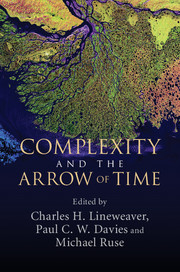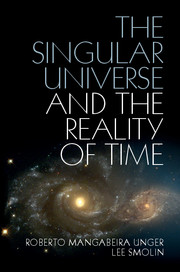Complexity and the Arrow of Time
There is a widespread assumption that the universe in general, and life in particular, is 'getting more complex with time'. This book brings together a wide range of experts in science, philosophy and theology and unveils their joint effort in exploring this idea. They confront essential problems behind the theory of complexity and the role of life within it: what is complexity? When does it increase, and why? Is the universe evolving towards states of ever greater complexity and diversity? If so, what is the source of this universal enrichment? This book addresses those difficult questions, and offers a unique cross-disciplinary perspective on some of the most profound issues at the heart of science and philosophy. Readers will gain insights in complexity that reach deep into key areas of physics, biology, complexity science, philosophy and religion.
- Brings together cosmological, biological and philosophical perspectives to explore one of the most fundamental questions about the nature of our universe
- Aimed at a broad audience interested in the more philosophical aspects of science
- Written by a broad range of authoritative and respected experts to give a unique cross-disciplinary view on complexity
Reviews & endorsements
'The emergence of complex systems after the Big Bang, from a Universe that started out in a very simple state, is one of the great puzzles of science. This book provides the best single-volume insight into the nature of this puzzle, and hints at its possible resolution. It may be the answer to life, the Universe, and everything.' John Gribbin, University of Sussex
'In physics, chemistry and biology, the topic of complexity is, in a word, complicated. This collection is invaluable as an introduction to the many intractable open questions this subject raises, such as how best to define complexity, and how, why and if it increases.' Jeremy Butterfield, University of Cambridge
'… fascinating lines of thought …' Daniel McShea, Science
'This work is essential reading for researchers in almost every philosophy- or theory-based field. It exposes the universe as a 'quantum computer' from which meaning can be found only through intradisciplinary and interdisciplinary thinking … Highly recommended.' J. A. van Reenen, Choice
Product details
July 2013Adobe eBook Reader
9781107273269
0 pages
0kg
14 b/w illus.
This ISBN is for an eBook version which is distributed on our behalf by a third party.
Table of Contents
- 1. What is complexity? Is it increasing? Charles H. Lineweaver, Paul C. W. Davies and Michael Ruse
- 2. Directionality principles from cancer to cosmology Paul C. W. Davies
- 3. A simple treatment of complexity: cosmological entropic boundary conditions on increasing complexity Charles H. Lineweaver
- 4. Using complexity science to search for unity in the natural sciences Eric J. Chaisson
- 5. On the spontaneous generation of complexity in the universe Seth Lloyd
- 6. Emergent spatiotemporal complexity in field theory Marcelo Gleiser
- 7. Life: the final frontier for complexity? Simon Conway Morris
- 8. Evolution beyond Newton, Darwin, and entailing law: the origin of complexity in the evolving biosphere Stuart A. Kauffman
- 9. Emergent order in processes: the interplay of complexity, robustness, correlation, and hierarchy in the biosphere D. Eric Smith
- 10. The inferential evolution of biological complexity: forgetting nature by learning to nurture David C. Krakauer
- 11. Information width: a way for the second law to increase complexity David Wolpert
- 12. Wrestling with biological complexity: from Darwin to Dawkins Michael Ruse
- 13. The role of generative entrenchment and robustness in the evolution of complexity William C. Wimsatt
- 14. On the plurality of complexity-producing mechanisms Philip Clayton
- Index.





